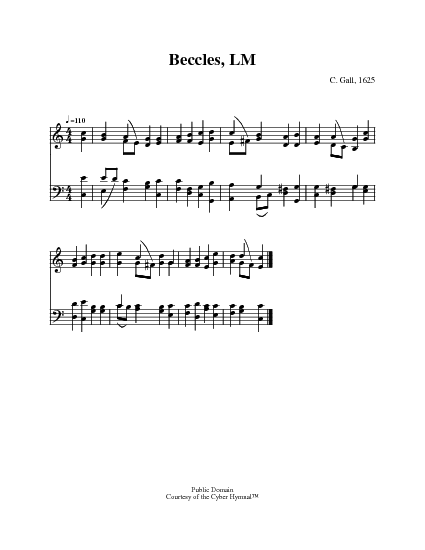A Church Hymn Book #175
Display Title: The great forerunner of the morn First Line: The great forerunner of the morn Meter: L. M. Date: 1861 Subject: For Holidays |
A Church Hymn Book #175

1 The great forerunner of the morn,
The herald of the Word, is born;
And faithful hearts shall never fail
With thanks and praise his light to hail.
2 With heav'nly message Gabriel came,
That John should be that herald's name,
And with prophetic utt'rance told
His actions great and manifold.
3 Though not yet born, John gave aright
His witness to the coming Light;
And Christ, the Sun of all the earth,
Fulfilled that witness at his birth.
4 John's mighty deeds exalt his fame
To greater than a prophet's name;
Of woman born shall never be
A greater prophet than was he.
Source: RitualSong (2nd ed.) #974
 Bede (b. circa 672-673; d. May 26, 735), also known as Saint Bede or the Venerable Bede, was an English monk at Northumbrian monastery at Monkwearmouth (now Jarrow). Sent to the monastery at the young age of seven, he became deacon very early on, and then a priest at the age of thirty. An author and scholar, he is particularly known for his Ecclesiastical History of the English People, which gained him the title “Father of English History.” He also wrote many scientific and theological works, as well as poetry and music. Bede is the only native of Great Britain to have ever been made a Doctor of the Church. He died on Ascension Day, May 26, 735, and was buried in Durham Cathedral.
Laura de Jong… Go to person page >
Bede (b. circa 672-673; d. May 26, 735), also known as Saint Bede or the Venerable Bede, was an English monk at Northumbrian monastery at Monkwearmouth (now Jarrow). Sent to the monastery at the young age of seven, he became deacon very early on, and then a priest at the age of thirty. An author and scholar, he is particularly known for his Ecclesiastical History of the English People, which gained him the title “Father of English History.” He also wrote many scientific and theological works, as well as poetry and music. Bede is the only native of Great Britain to have ever been made a Doctor of the Church. He died on Ascension Day, May 26, 735, and was buried in Durham Cathedral.
Laura de Jong… Go to person page > John M. Neale's life is a study in contrasts: born into an evangelical home, he had sympathies toward Rome; in perpetual ill health, he was incredibly productive; of scholarly temperament, he devoted much time to improving social conditions in his area; often ignored or despised by his contemporaries, he is lauded today for his contributions to the church and hymnody. Neale's gifts came to expression early–he won the Seatonian prize for religious poetry eleven times while a student at Trinity College, Cambridge, England. He was ordained in the Church of England in 1842, but ill health and his strong support of the Oxford Movement kept him from ordinary parish ministry. So Neale spent the years between 1846 and 1866 as a warden of Sackvi… Go to person page >
John M. Neale's life is a study in contrasts: born into an evangelical home, he had sympathies toward Rome; in perpetual ill health, he was incredibly productive; of scholarly temperament, he devoted much time to improving social conditions in his area; often ignored or despised by his contemporaries, he is lauded today for his contributions to the church and hymnody. Neale's gifts came to expression early–he won the Seatonian prize for religious poetry eleven times while a student at Trinity College, Cambridge, England. He was ordained in the Church of England in 1842, but ill health and his strong support of the Oxford Movement kept him from ordinary parish ministry. So Neale spent the years between 1846 and 1866 as a warden of Sackvi… Go to person page >| First Line: | The great forerunner of the morn |
| Title: | The Great Forerunner of the Morn |
| Latin Title: | Precursor altus luminis |
| Author: | The Venerable Bede |
| Translator: | J. M. Neale |
| Meter: | 8.8.8.8 |
| Language: | English |
| Copyright: | Public Domain |


 My Starred Hymns
My Starred Hymns